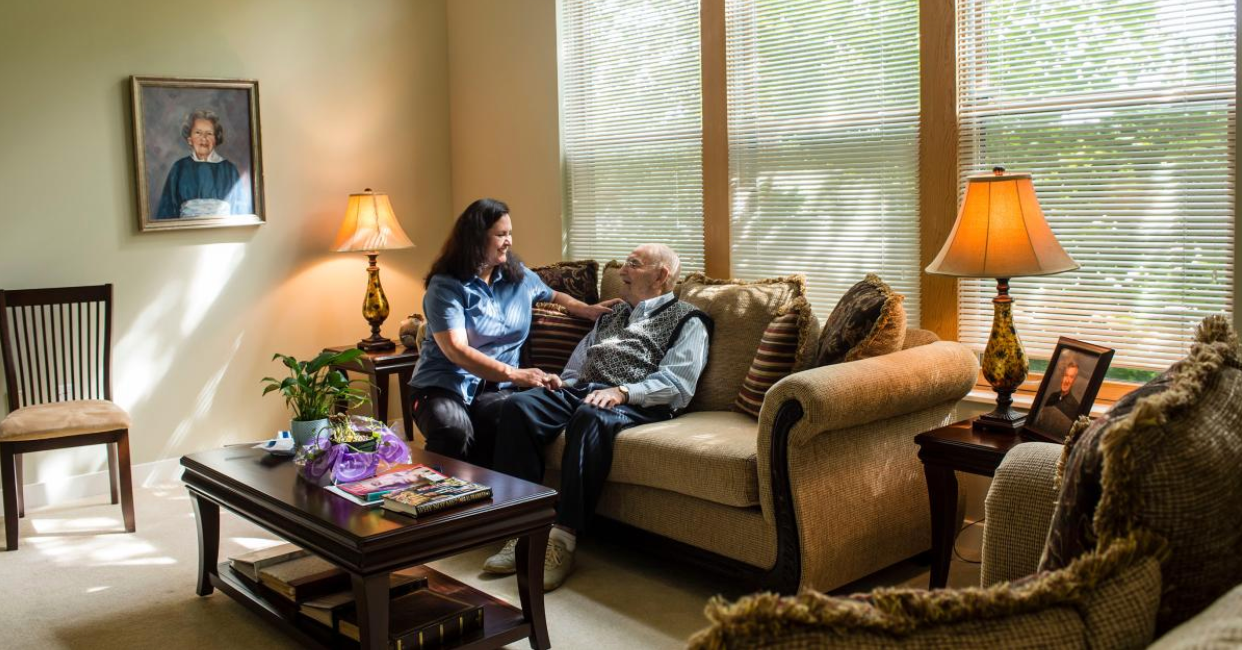What Is the Life Expectancy After Sepsis?
What is the Life Expectancy After Sepsis?
Life expectancy after sepsis depends on factors like age, overall health, organ damage, and how quickly treatment began, with many survivors facing lasting effects known as post-sepsis syndrome—such as fatigue, memory issues, and recurring infections. In-home care can make a life-changing difference by providing daily support, medication management, and personalized rehabilitation that helps rebuild strength, restore independence, and improve long-term quality of life.
When there is no support at home after sepsis, survivors often struggle to manage the complex aftermath of the illness, which can include fatigue, cognitive decline, weakened immunity, chronic pain, and mobility issues. Without consistent care and monitoring, these individuals are at higher risk of hospital readmission, complications from missed medications or untreated infections, and a decline in both physical and mental health. The lack of structured rehabilitation and emotional support can accelerate deterioration, increase the likelihood of additional medical crises, and significantly reduce overall life expectancy. A supportive home care environment is often critical to stabilizing health, regaining function, and preventing a downward spiral that unmanaged post-sepsis symptoms can trigger.
A highly trained and experienced home health aide from a trusted home care agency like 7 Day Home Care can make a life-saving difference for individuals recovering from sepsis. These professionals are not only equipped to assist with essential daily tasks like bathing, mobility, medication reminders, and meal preparation—they are also trained to recognize early warning signs of infection, understand complex care routines, and provide emotional reassurance that helps reduce stress-related health risks. With compassionate and culturally sensitive care, a dedicated home health aide brings structure, stability, and clinical oversight into the home environment—elements that are especially critical in the vulnerable months following a sepsis episode. Families across NYC, Manhattan, Queens, Brooklyn, and Long Island rely on 7 Day Home Care’s certified aides to extend life after sepsis by promoting safety, independence, and long-term wellness right at home.
7 Day Home Care provides low cost private pay in-home care services and is an approved provider under many insurance policies, including your long term care insurance policy - throughout NYC -Manhattan, Queens, Brooklyn, and Long Island, New York. To learn more about our award winning home health aide care services for in-home Alzheimer's and dementia care, please call 516-408-0034 to schedule your free consultation.

Understanding Sepsis and Its Long-Term Impact on Health
Sepsis is a life-threatening medical emergency that occurs when the body's response to an infection triggers widespread inflammation, leading to tissue damage, organ failure, or even death. According to the CDC, more than 1.7 million Americans develop sepsis each year, and nearly 1 in 3 hospital deaths are sepsis-related. While advances in critical care have improved survival rates, many people are left wondering:
What is the life expectancy after surviving sepsis?
At 7 Day Home Care, we often support families whose loved ones are recovering from sepsis at home. This article explores what determines life expectancy after sepsis, the challenges of post-sepsis syndrome, and how in-home care can make a life-changing difference in recovery and quality of life.
What Happens to the Body After Surviving Sepsis?
Surviving sepsis does not always mean a full recovery. Many survivors—especially older adults—experience lingering physical, cognitive, and emotional effects. This cluster of complications is known as post-sepsis syndrome (PSS) and can impact long-term health outcomes significantly.
Common Long-Term Effects After Sepsis
- Chronic fatigue and weakness
- Muscle and joint pain
- Memory loss and difficulty concentrating ("brain fog")
- Anxiety, depression, and PTSD
- Recurrent infections due to weakened immunity
- Organ dysfunction or damage (lungs, kidneys, heart, etc.)
These challenges can make day-to-day functioning difficult, particularly for older adults or individuals with preexisting health conditions. Understanding the risk factors and statistics surrounding post-sepsis life expectancy is key to preparing for long-term care needs.
Life Expectancy After Sepsis: What the Research Says
While there is no one-size-fits-all answer, multiple studies have examined how sepsis impacts life expectancy. The data suggests that while many people survive the initial event, their long-term survival is often reduced compared to peers who did not experience sepsis.
Key Sepsis Survival Statistics:
- 1 in 5 sepsis survivors die within 1 year
- 60% of survivors are re-hospitalized within 90 days
- Older adults have a significantly higher risk of mortality
- Survivors are at greater risk for future infections and chronic illness
A 2020 study in JAMA found that sepsis survivors had a 3.3-year lower life expectancy on average compared to similar patients who did not experience sepsis. However, outcomes vary widely depending on age, health status before sepsis, and the severity of the condition.
Factors That Affect Life Expectancy After Sepsis
1. Age: Older adults—especially those over 65—face the highest mortality rates both during and after sepsis. Their immune systems are weaker, and many already have other chronic conditions.
2. Severity of Organ Damage: The more organs affected during the septic episode, the lower the chances of full recovery. Prolonged ICU stays or mechanical ventilation may indicate more extensive damage.
3. Preexisting Medical Conditions: Conditions such as diabetes, COPD, heart failure, or cancer reduce a person's ability to recover fully after sepsis.
4. Time to Treatment: Early detection and rapid antibiotic treatment are crucial. Delayed care increases mortality risk.
5. Support After Discharge: Patients with access to professional in-home care and physical therapy have a better chance of regaining strength, managing medications, and avoiding complications.
What Is Post-Sepsis Syndrome (PSS)?
Post-sepsis syndrome affects up to 50% of sepsis survivors, especially older adults. Symptoms may persist for months or years and can greatly reduce life expectancy if not properly managed.
Symptoms of Post-Sepsis Syndrome:
- Cognitive impairment (memory, concentration)
- Physical weakness and deconditioning
- Sleep disturbances
- Emotional distress (anxiety, depression)
- Reduced ability to perform ADLs (activities of daily living)
How 7 Day Home Care Helps
Our trained caregivers and licensed nurses help manage the daily challenges of PSS by providing:
- Medication management
- Mobility and transfer assistance
- Meal preparation tailored to recovery
- Companionship and emotional support
- Coordination with doctors, therapists, and family members
Does Sepsis Shorten Your Life?
Yes, studies consistently show that sepsis survivors—especially older adults—have a higher risk of early death. Even among people who recover well in the short term, the 1- to 5-year survival rate is often lower compared to those who never experienced sepsis.
However, it's important to note that outcomes vary. With comprehensive post-sepsis care, infection prevention strategies, and a supportive home environment, many seniors go on to live meaningful, engaged lives.
How Home Care Extends Life After Sepsis
1. Prevents Hospital Readmission
The highest risk period for sepsis survivors is the first 90 days. In-home caregivers can monitor for early signs of infection, manage medications properly, and ensure follow-up appointments are not missed.
2. Supports Recovery and Rehabilitation
Professional home health aides help with physical therapy routines, assist with walking and exercises, and reduce fall risk—all of which are critical for regaining strength.
3. Improves Mental and Emotional Health
Loneliness, confusion, and anxiety are common after sepsis. Caregivers offer consistent companionship, reducing feelings of isolation and supporting mental clarity.
4. Promotes Safe, Clean Living Environments
Sepsis often originates from infections like UTIs, wounds, or pneumonia. Home aides can help ensure cleanliness, hygiene, and nutrition are all maintained to prevent reinfection.
Sepsis Recovery Timeline and What to Expect
First 30 Days:
- Fatigue, weakness, and confusion are common
- Focus on rest, hydration, medication compliance
- Begin gentle physical therapy
30–90 Days:
- Symptoms may improve gradually
- Appetite and energy often increase
- Monitor closely for signs of infection or setbacks
3–12 Months:
- Recovery may plateau
- Mental and physical therapy should continue
- Regular check-ins with primary care and specialists are important
Beyond 1 Year:
- Survivors often settle into a “new normal”
- Some fully regain independence, others require long-term care
FAQs About Life After Sepsis
How long can someone live after sepsis?
It varies. Some seniors recover and live for many more years, while others face complications that reduce life expectancy. Ongoing care plays a major role in survival.
Can you fully recover from sepsis?
Some do, but many survivors have long-term effects. Recovery depends on age, health before sepsis, and quality of post-discharge support.
What are the chances of surviving sepsis twice?
The risk of recurrence is real. Good infection control, follow-up care, and a strong immune system are key to reducing repeat episodes.
Should a person with sepsis be discharged home?
Not immediately. Most need hospital care first. After stabilization, home care can provide a safer recovery environment, especially for seniors.
Final Thoughts: Life After Sepsis Is Challenging—But It Can Be Lived Well
While sepsis can shorten life expectancy, early intervention, rehabilitation, and high-quality home care can dramatically improve outcomes. At 7 Day Home Care, we specialize in helping sepsis survivors regain control of their lives with dignity, support, and expert care at home.
If your loved one has survived sepsis and you’re unsure what comes next, call 7 Day Home Care. We provide low cost private pay in-home care services and are an approved provider under many insurance policies, including your long term care insurance policy - throughout NYC -Manhattan, Queens, Brooklyn, and Long Island, New York. To learn more about our award winning home health aide care services, please call 516-408-0034 to schedule your free consultation.
Brian Callahan
7 Day Home Care










